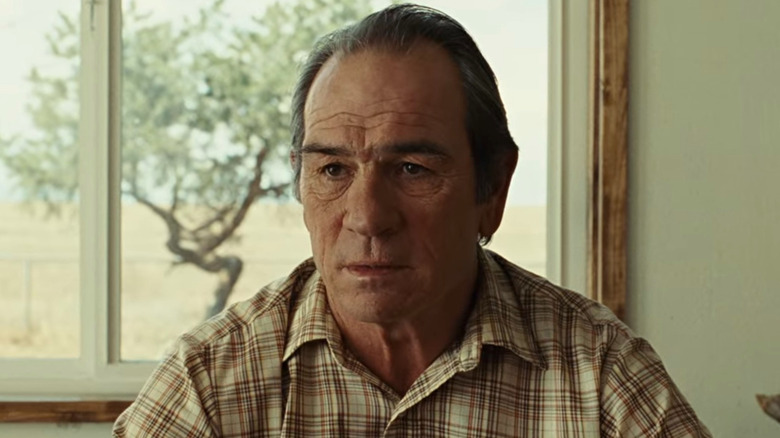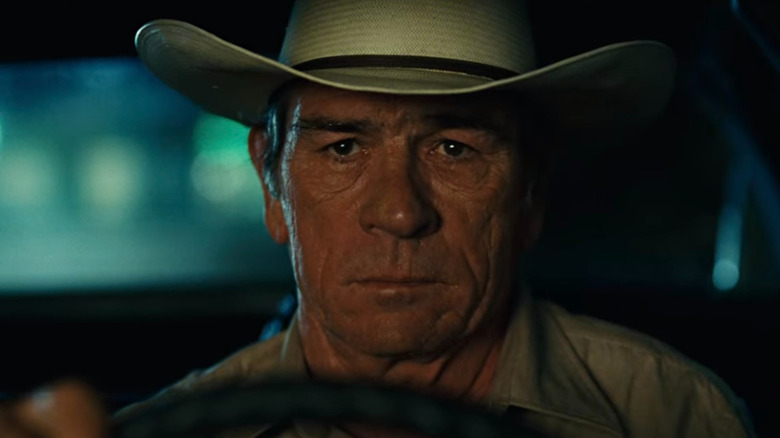The Coen Brothers Struggled With One Key Aspect Of Tommy Lee Jones’ No Country For Old Men Role

Joel and Ethan Coen's Oscar-winning film adaptation of "No Country for Old Men" is faithful in many respects to the Cormac McCarthy novel on which it's based. Yet by its very nature as a movie, there were some things that "No Country for Old Men" had to approach differently than the book. Readers may recall that each new section of chapters in McCarthy's novel was marked off by Roman numerals and preceded by a page or three of italicized first-person narration from Sheriff Ed Tom Bell, the character Tommy Lee Jones brought to life in the movie. Since the rest of the novel unfolded in third-person voice, the italics gave us a window into Bell's mind and helped establish him as the main character right from the start.
That's something much easier to get away with on the page than it would be on the screen, which is traditionally concerned more with dramatizing events and visually depicting external reality, as opposed to just putting the audience inside a character's head in voiceover or having them say what they think out loud in dialogue. It presented the Coen brothers with an immediate challenge in adapting "No Country for Old Men." As Joel himself put it (via Behind the Curtain):
"The book is sort of checkerboarded with these chapters that are first person, sort of, ruminations of the sheriff. You know, these just internal monologues, him thinking about things, some of them not even directly related to the story. And one of the first things that we sort of had to decide, because it's such a fundamental part of the book, when we were adapting it was what to do with that."
'Too Big A Thing'

"No Country for Old Men" does make sparing use of voiceover, but to really convey the fullness of Bell's book monologues, it would have almost needed to employ a Terence Malick level of narration. Instead, the Coen brothers elected to have Bell's deputy, Wendell, played by Garret Dillahunt, act as a springboard for some of his thoughts.
"For the most part," Joel acknowledged, "[Bell's narration is] not there in the movie, except to the extent that we incorporated parts of it that we thought were important to sort of maintain the voice of that character in dramatic scenes. Particularly scenes the sheriff has with his deputy throughout the movie."
Another option, which the Coens never seriously considered, was the use of flashbacks to show some of the World War II backstory and other things Bell reveals in his book narration. Ultimately, they decided that there was just too much material and it needed to be streamlined.
"We kind of became resigned," Ethan said, "to the fact that was too big, that the war experience, this thing was too big a thing to treat either as a kind of voiceover monologue or what? I don't know, it was a puzzle. Or to kind of – you know, the odious thing is, you can have flashbacks, which was totally absurd."
The only downside to the Coens' approach is that the ending of "No Country for Old Men" may have thrown some viewers for a loop, since the movie was weighted more toward Josh Brolin's character, Llewelyn Moss, at the beginning. It almost seemed to pull a bait-and-switch with him and Bell as the protagonist, but in a way, that goes toward the idea that we're all the main character in our own story until fate catches up with us.
Read this next: The Coen Brothers Movies Ranked Worst To Best
The post The Coen Brothers Struggled With One Key Aspect Of Tommy Lee Jones' No Country For Old Men Role appeared first on /Film.
